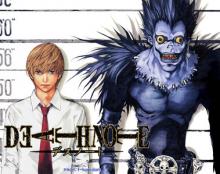If there's one thing all cultures have in common regardless of any stylistic idiosyncrasies is that they're all willing to run something popular into the ground with a complete lack of shame. Much like Twilight is currently consuming every facet of culture in America, the years of 2003 through 2008 in Japan were dominated by all things Death Note. Tsugumi Ohba's wildly popular manga series has been subject to more redundant adaptations than practically any other property in the history of the medium. It got the requisite anime treatment, which makes sense, but it also found its way into a light novel, no fewer than three feature-length, live-action films and a smattering of video games. Most of these items have found their way to the United States, though not surprisingly the handheld Nintendo DS game about plotting the excruciating details of a person's death failed to find its way to our shores where the target demographic for video games tends to age in direct proportion to the income of those who can afford the hardware to run them, i.e. a game requiring a $2000 PC might actually have interesting writing and adult themes, while $300 consoles aim entirely for violence-obsessed teenage boys and $100 handheld systems are almost exclusively the realm of children who must be tricked into receiving an education. Because Death Note was so ubiquitous it only stands to reason that I've been urged to watch the TV series by everyone, everyone's mother and everyone's mother's hair dresser ever since I started, then finished the recurring Anime Friday feature on this blog a year ago.
What surprised me is that Death Note is actually pretty good. It's not the best anime I've seen and it's ridiculous on a frequent enough basis that I can't take it as seriously as, say, the entire People's Republic of China does, but there are a lot of things about Death Note that puts it leagues ahead of its contemporaries.
First of all, Madhouse's animated adaptation is painfully pretty. It's part of a recent crop of anime that exist primarily to put smiles on the faces of people who have inexplicable fetishes for beautiful scenery. Just like every wistful coming-of-age anime from the past five years can't help but be 90 minutes of cloud porn, Death Note revels in the disturbingly immaculate and often shiny world inhabited by its main character, a young man with the absurd name of Light. Honestly, sometimes I think characters from manga and Japanese role playing games are named by putting an Oxford English Dictionary in a wood chipper and choosing whichever fragment falls on the writer's tongue. Speaking of tongues, it doesn't help that Japanese linguistic conventions lead to a series full of people saying "Right-o" all the time. It's very hard to take a story seriously when it sounds like the creepy death spirit is constantly answering in a peppy version of the affirmative.
But that doesn't make a whole lot of difference because Light happens to be one of the most interesting manga/anime characters in history. His name could be Cotton Candy Puppy Lips and it would still be awesome to spend twenty minutes a week trying to sympathize with a serial killer who strokes his god complex like Blowfeld strokes his pet cat. Light is like Patrick Bateman with super powers and an unshakable sense of nigh-biblical morality. The initial premise of an unassuming notebook that can kill anyone whose name is written in it is interesting and unique enough to stand on its own, but the real delight of the series is that much of it is basically about two isolated geniuses trying to screw with one another because they both believe they have moral superiority.
Of course, Death Note, like all anime series, would be better as a 13-episode affair than the 37 that actually got produced. The nicely contained story of Light's cat-and-mouse game with cagey investigator L gives way to a complicated mythology of multiple notebooks, Light's would-be successors and a foregone conclusion of power and corruption. Death Note is fun, easy on the eyes and avoids a lot of the pitfalls of anime cliche. It may not be worth 14 hours of viewership, but I can think of less interesting content to become immensely popular.
